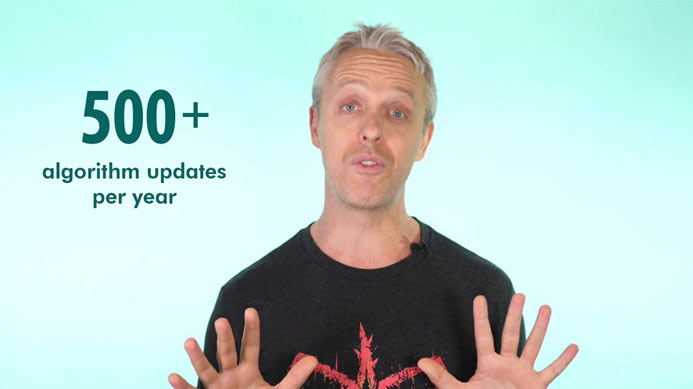Video Transcript
SEO is complex at the best of times. But Google likes to make it even harder – it’s constantly changing the algorithm that determines how web pages rank in search results. In fact, every year Google releases over 500 algorithm updates.
So what did Google change in 2019, and how will it affect you?
I’m Ben Carew, the host of ‘SEO Hacks for SME’s’. In this video I’ll reveal the top 4 most important Google algorithm updates of 2019 – and what you can do about them.
1. The March Core Update AKA “Florida 2”
Did you notice a big drop in traffic to your site around March 2019? You were probably affected by the ‘Florida 2’ update. Sites with a reliance on backlinks from private blog networks, and many medical websites saw their SEO plummet on the back of this update.
ACTION: review your backlinks and check for any reliance on spammy blog networks.
2. The June “Diversity Update”
The Diversity Update was intended to stop multiple search results from the same website appearing on page 1 of Google. If you previously enjoyed multiple entries for a key term, this may have ended – potentially reducing your traffic.
ACTION: check Google Search Console to see if your traffic has recently dropped for key search terms. If so, create new content for different search terms.
3. Removal of Google My Business ratings
Businesses who rely on Google reviews to attract new customers and chose to display these on their websites experienced disappointment in September this year. Why? Google chose to remove the gold review stars from the allowable schema mark-up in their search results pages.
If you’ve been using a website plug-in to display your Google My Business ratings in the search results, it probably boosted your ‘click through rate’.
Now that’s gone for good, you might find your CTR is down and you’re getting less enquiries. That said, everyone with stars were equally impacted, so meh.
ACTION: in order to get your CTA back up, rewrite your page titles so they stand out from your competitors.
4. The October “BERT update”
BERT stands for ‘Bidirectional Encoder Representations from Transformers’.
Translated: BERT is a machine learning advancement by Google to better process words in relation to all the other words in a sentence – rather than one-by-one in order.
This gives more impetus to the intent and context of the search query. It affects 10% of ALL search queries.
Websites with well-written, sophisticated text that provides high-value content to users are likely to enjoy more traffic over time.
ACTION: review your web copy and improve it. Fix typos and replace any ‘boiler plate’ text.
OK so hopefully that’s helped show you how dynamic the Google algorithm is, and what urgent SEO changes you need to make. In the end Google is always working to serve up the best result for the user’s search query, so if you keep this in mind when creating content, you can stay one step ahead of many algorithm updates.
For information on historical Google algorithm updates, Moz keeps track of them all here.
What are your thoughts on where Google is heading and what it is doing? Leave a comment below.









